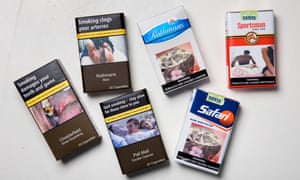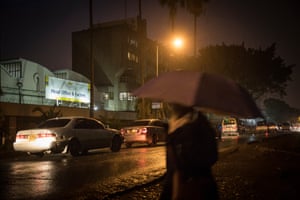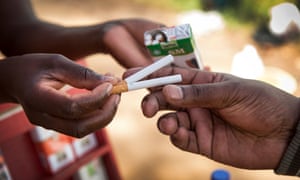Threats, bullying, lawsuits: tobacco industry's dirty war for the African market | World news
British American Tobacco (BAT) and other multinational tobacco firms have threatened governments in at least eight countries in Africa demanding they axe or dilute the kind of protections that have saved millions of lives in the west, a Guardian investigation has found.
BAT, one of the world’s leading cigarette manufacturers, is fighting through the courts to try to block the Kenyan and Ugandan governments’ attempts to bring in regulations to limit the harm caused by smoking. The giant tobacco firms hope to boost their markets in Africa, which has a fast-growing young and increasingly prosperous population.
In one undisclosed court document in Kenya, seen by the Guardian, BAT’s lawyers demand the country’s high court “quash in its entirety†a package of anti-smoking regulations and rails against what it calls a “capricious†tax plan. The case is now before the supreme court after BAT Kenya lost in the high court and the appeal court. A ruling is expected as early as next month.
BAT in Uganda asserts in another document that the government’s Tobacco Control Act is “inconsistent with and in contravention of the constitutionâ€.
The Guardian has also seen letters, including three by BAT, sent to the governments of Uganda, Namibia, Togo, Gabon, Democratic Republic of Congo, Ethiopia and Burkina Faso revealing the intimidatory tactics that tobacco companies are using, accusing governments of breaching their own laws and international trade agreements and warning of damage to the economy.
BAT denies it is opposed to all tobacco regulation, but says it reserves the right to ask the courts to intervene where it believes regulations may not comply with the law.
Later this month, BAT is expected to become the world’s biggest listed tobacco firm as it completes its acquisition of the large US tobacco company Reynolds in a $49bn deal, and there are fears over the extent to which big tobacco can financially outmuscle health ministries in poorer nations. A vote on the deal by shareholders of both firms is due to take place next Wednesday, simultaneously in London at BAT and North Carolina at Reynolds.
Professor Peter Odhiambo, a former heart surgeon who is head of the government’s Tobacco Control Board in Kenya, told the Guardian: “BAT has done as much as they can to block us.â€
Experts say Africa and southern Asia are urgent new battlegrounds in the global fight against smoking because of demographics and rising prosperity. Despite declining smoking and more controls in some richer countries, it still kills more than seven million people globally every year, according to the WHO, and there are fears the tactics of big tobacco will effectively succeed in “exporting the death and harm†to poorer nations.
There are an estimated 77 million smokers in Africa and those numbers are predicted to rise by nearly 40% from 2010 levels by 2030, which is the largest projected such increase in the world.
In Kenya, BAT has succeeded in delaying regulations to restrict the promotion and sale of cigarettes for 15 years, fighting through every level of the legal system. In February it launched a case in the supreme court that has already halted the imposition of tobacco controls until probably after the country’s general election in August, which are being contested by parliamentarians who have been linked to payments by the multinational company.
In Uganda, BAT launched legal action against the government in November, arguing that the Tobacco Control Act, which became law in 2015, contravenes the constitution. It is fighting restrictions that are now commonplace in richer countries, including the expansion of health warnings on packets and point-of-sale displays, arguing that they unfairly restrict its trade.
The court actions are brought by BAT’s local affiliates, BAT Kenya and BAT Uganda, but approved at Globe House, the London headquarters of the multinational, which receives most of the profits from the African trade. In its 2016 annual report, BAT outlined the “risk†that “unreasonable litigation†would be brought in to control tobacco around the world. Its response was an “engagement and litigation strategy coordinated and aligned across the Groupâ€.
‘Focus on emerging markets’

At its annual meeting in March, chairman Richard Burrows toasted a “vintage year†for BAT, as profits rose 4% to £5.2bn after investors took their cut â€" their dividend had increased by 10%. When asked about the legal actions in Africa, he said tobacco was an industry that “should be regulated ... but we want to see that regulation is serving the correct interests of the health mission and human mission which should lie behind itâ€.
So, “from time to time it’s necessary for us to take legal action to challenge new regulation†which he said was led by “the local boardâ€.
BAT says it is “simply not true that we oppose all tobacco regulation, particularly in developing countriesâ€. Tobacco should be appropriately regulated as a product that has risks to health, it said, but “where there are different interpretations of whether regulations comply with the law, we think it is entirely reasonable to ask the courts to assist in resolving itâ€. It was opposed to only a handful of the issues in Kenya’s regulations, not the entirety, it said in a statement.
Although most countries in Africa have signed the World Health Organisation (WHO) treaty on tobacco control, none has yet fully implemented the smoking restrictions it endorses.
The WHO predicts that by 2025, smoking rates will go up in 17 of the 30 Africa-region countries from their 2010 level. In some countries a massive hike is expected â€" in Congo-Brazzaville, from 13.9% to nearly half the population (47.1%) and in Cameroon from 13.7% to 42.7%. In Sierra Leone it will be 41.2% (74% among men) and in Lesotho 36.9%.
In contrast, research showed last year that just 16.9% of adults smoke in the UK; and last month new figures showed UK heart disease deaths had fallen 20% since that country’s indoor smoking ban.
“The tobacco industry is now turning its focus toward emerging markets in sub-Saharan Africa, seeking to exploit the continent’s patchwork tobacco control regulations and limited resources to combat industry marketing advances,†said Dr Emmanuela Gakidou and colleagues at the Institute for Health Metrics and Evaluation at the University of Washington in Seattle, publishing an analysis of smoking prevalence around the world in the Lancet in April.
Africa’s growing numbers of children and young people, and its increasing wealth, represent a huge future market for the tobacco industry. The companies deny targeting children and cannot sell packs smaller than 10, but a new study carried out in Nairobi by the Johns Hopkins school of public health in the US and the Kenya-based Consumer Information Network found vendors selling cigarettes along the routes children take to walk to primary schools.
Stalls sell single Dunhill, Embassy, Safari and other BAT cigarette sticks, costing around 4p (5 cents) each, alongside sweets, biscuits and fizzy drinks. The vendors split the packets of 20 manufactured by BAT. “They are targeting children,†said Samuel Ochieng, chief executive of the Consumer Information Network. “They mix cigarettes with candies and sell along the school paths.â€
BAT said that its products were for adult smokers only and that it would much prefer that stalls sold whole packets rather than single sticks, “given our investment in the brands and the fact there are clear health warnings on the packs.
“Across the world, we have very strict rules regarding not selling our products to retailers located near schools. BAT Kenya provides support to many of these independent vendors, including providing stalls painted in non-corporate colours, and providing youth smoking prevention and health warnings messages. We also educate vendors to ensure they do not sell tobacco products near schools.â€
Links with politicians

The Kenya case, expected to be heard after the elections on 8 August, is seen as critical for the continent. If the government loses, other countries will have less appetite for the long and expensive fight against the wealthy tobacco industry.
BAT has around 70% of the Kenyan market; its Kenyan competitor, Mastermind, has joined in the legal action against the government.
Concerns have been raised about links between politicians and the tobacco companies. “There are allegations of some of them having been bribed in the past,†said Joel Gitali, chief executive of the Kenya Tobacco Control Alliance.
BAT whistleblower Paul Hopkins, who worked in Africa for BAT for 13 years, told a British newspaper he paid bribes on the company’s behalf to the Kenya Revenue Authority for access to information BAT could use against its Kenyan competitor, Mastermind. Hopkins has also alleged links between certain prominent opposition Kenyan politicians and two tobacco companies, BAT Kenya and Mastermind. Hopkins, who says he alerted BAT to the documents before the company made him redundant, claimed BAT Kenya paid bribes to government officials in Burundi, Rwanda and the Comoros Islands to undermine tobacco control regulations. Gitali is concerned about the outcome of the election: “If the opposition takes over government we shall be deeply in the hands of the tobacco companies.â€
BAT denies any wrongdoing. A spokesperson said: “We will not tolerate improper conduct in our business anywhere in the world and take any allegations of misconduct extremely seriously. We are investigating, through external legal advisors, allegations of misconduct and are liaising with the Serious Fraud Office and other relevant authorities.â€
‘We grow up dreaming we can be one of them’

Tih Ntiabang, regional coordinator for Africa of the Framework Convention Alliance â€" NGOs that support the WHO treaty â€" said the tobacco companies had become bolder. “In the past it used to be invisible interference, but today it is so shameful that it is so visible and they are openly opposing public health treaties like the case in Kenya at the moment … Today they boldly go to court to oppose public health policy. Every single government is highly interested in economic growth. They [the tobacco companies] know they have this economic power. The budget of tobacco companies like BAT could be as much as the whole budget of the Africa region.
“Our health systems are not really well organised. Our policy makers can’t see clearly what are the health costs of inaction on tobacco control because our health system is not very good. It puts the tobacco industry at an advantage on public health.â€
The sale across the whole of Africa of single cigarette sticks was a serious problem because it enabled children to buy them. “They are extremely affordable. Young teenagers are able to purchase a cigarette. You don’t need £1 for a pack of 20,†he said.
BAT has a reputation in Africa as an employer offering steady and well-paid jobs, said Ntiabang, based in Cameroon. “When I was about 10, I was always dreaming I could work for BAT. They have always painted themselves as a responsible company â€" a dream company to work for. All the staff are well-off. The young people think ‘I want to work for BAT’. They promote a lot of events and make their name appear to young people. We grow up dreaming we can be one of them.â€
In Uganda in 2014, BAT managing director, Jonathan D’Souza, sent a 13-page detailed attack on the tobacco control bill, then going through parliament, to the chair of the government’s health committee.
BAT was contracting with 18,000 farmers and paid them 61bn Ugandan shillings for 16.8m kg of tobacco in 2013, said the letter. The economy has “benefited significantly†from BAT Uganda’s investments, it said. “This has helped to alleviate poverty and improve welfare in urban and rural areas,†it says.
BAT Uganda (BATU) agreed tobacco should be regulated while “respecting the informed choices and rights of adults who choose to smoke and the legal rights of a legal industryâ€. But it cited 11 “areas of concernâ€, claiming there is no evidence to support a ban on tobacco displays in shops, that large graphic health warnings on packs are ineffective, that proposals on bans on smoking in public places were too broad and that prohibiting smoking under the age of 21 was unreasonable, since at 18 young people are adults and can make up their own mind.
Documents made public by the University of Bath show that BATU had another concern: the ban on the sale of cheap single cigarettes. Adults should be “free to purchase what they can affordâ€, says an internal leaked paper. BATU also took action against the MP who sponsored the bill. A letter informed him that the company would no longer be contracting with the 709 tobacco farmers in his region. There is evidence that the company also lobbied other MPs with tobacco farmers in their constituencies.
The Tobacco Control Act became law in 2015, and in November last year, BAT sued. Many people choose to smoke, said an affidavit to the court from managing director Dadson Mwaura and it was important to ensure regulation did not lead to “unintended consequences that risk an untaxed and unrestrained illegitimate trade in tobacco productsâ€. BATU’s legal product contributed to the Ugandan economy “in many dimensionsâ€.

The Guardian has seen letters showing that at least six other African governments have faced challenges from the multinational tobacco companies over their attempts to control smoking.
- Democratic Republic of Congo: Letter to the president sent in April 2017 by the Fédération des Entreprises du Congo (chamber of commerce) on behalf of the tobacco industry, listing 29 concerns with the proposed tobacco control regulations, which they claim violate the constitution, international agreements and domestic law.
- Burkina Faso: Letter sent in January 2016 to the minister of health from Imperial Tobacco, warning that restrictions on labeling and packaging cigarettes risks economic and social damage to the country. Previous letter sent to the prime minister from the US Chambers of Commerce in December 2013 warning that large health warnings and plain packaging could put Burkina Faso in breach of its obligations to the World Trade Organisation.
- Ethiopia: Letter sent in February 2015 to the ministers of health and science and technology by Philip Morris International, claiming that the government’s tobacco directive banning trademarks, brands and added ingredients to tobacco breached existing laws and would penalise all consumer retailers.
- Togo: Letter to the minister of commerce in June 2012 from Philip Morris International opposing plain packaging, which “risks having damaging consequences on Togo’s economy and business environmentâ€.
- Gabon: Letter from BAT arguing that there is no evidence that plain packaging reduces smoking, citing the Deloitte report of 2011, alleging its introduction would put Gabon in breach of trade agreements and promote smuggling.
- Namibia: Letter to the minister of health from BAT, warning that planned tobacco controls will have “a massive impact … on the Namibian economy at largeâ€.
Bintou Camara, director of Africa programs at Campaign for Tobacco-Free Kids, said: “British American Tobacco, Philip Morris International and other multinational tobacco companies have set their sights on Africa as a ‘growth market’ for their deadly productsâ€. Throughout Africa, tobacco companies have tried to intimidate countries from taking effective action to reduce tobacco use, the world’s leading cause of preventable death, he added.
“Governments in Africa should know that they can and should move forward with measures aimed at preventing and reducing tobacco use â€" and that they do so with the support of the many governments and leaders around the world that have taken strong action to protect public health.â€
Cloe Franko, senior international organizer at Corporate Accountability International, said: “In Kenya, as in other parts of the world, the industry has resorted to frivolous litigation, aggressive interference ... to thwart, block, and delay lifesaving policies. BAT’s actions are emblematic of a desperate industry grasping to maintain its hold over countries and continue to peddle its deadly product.â€
Philip Morris said it is regularly engaged in discussions with governments. “We are approached by or approach public authorities to discuss a range of issues that are important for them and for us, such as taxation, international trade, and tobacco control policies. Participating in discussions and sharing points of view is a basic principle of public policy making and does not stop governments from taking decisions and enacting the laws they deem best.†It said that it supports effective regulation, “including laws banning sales to minors, mandatory health warnings, and advertising restrictionsâ€.
Imperial Tobacco said it sold its brands “where there’s a legitimate and existing demand for tobacco and take the same responsible approach in Africa as we do in any Western territoryâ€. A spokesman said it supported “reasonable, proportionate and evidence-based regulation of tobaccoâ€, including “health warnings that are consistent with global public health messagesâ€. But, it said, Imperial would “continue to make our views known on excessive, unnecessary and often counter-productive regulatory proposalsâ€.

0 Response to "Threats, bullying, lawsuits: tobacco industry's dirty war for the African market | World news"
Posting Komentar